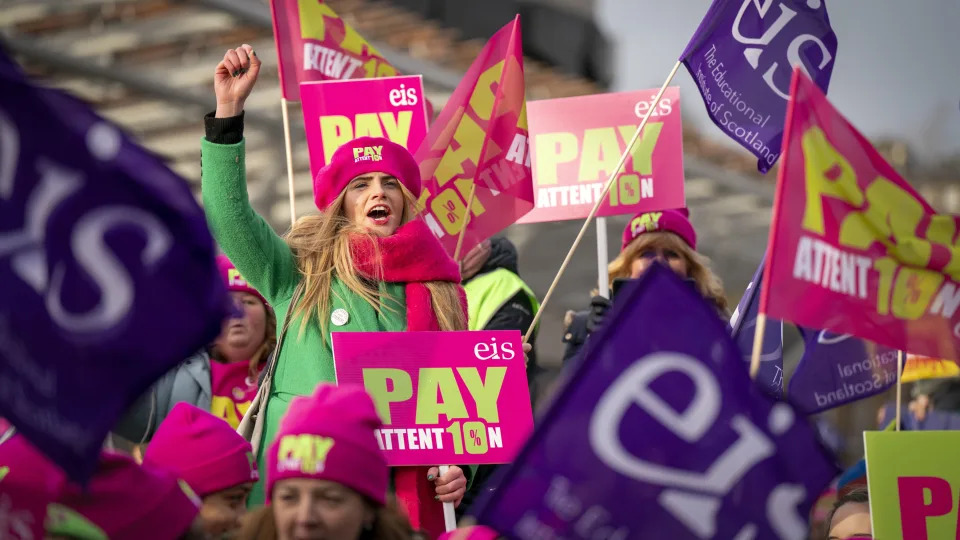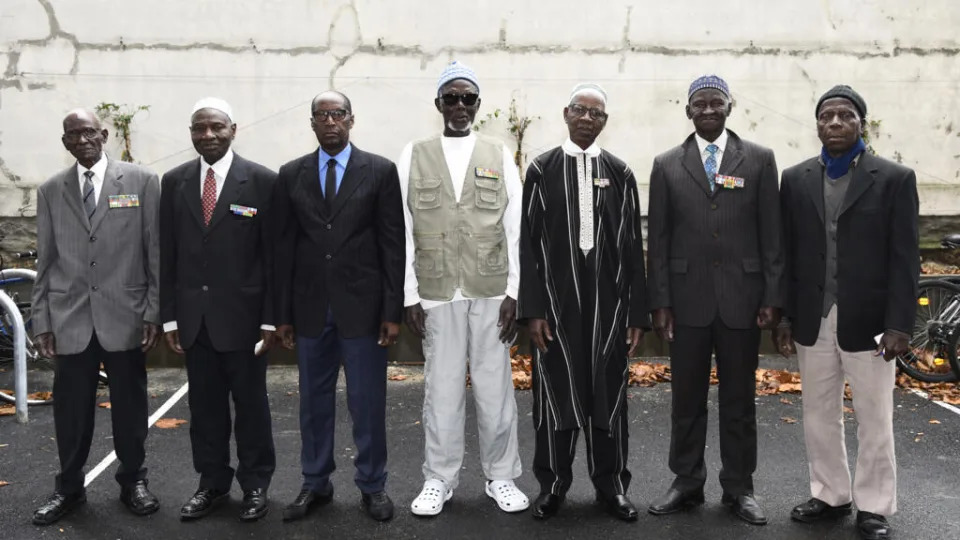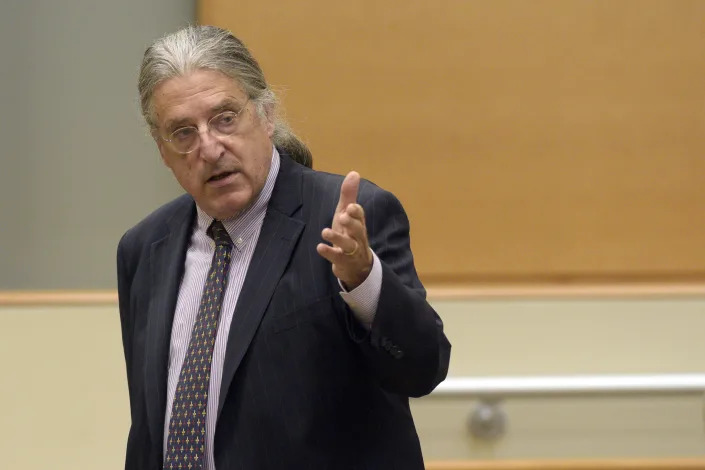UK
Here's What The Government Has Said About Its Own Anti-Union Strike Laws
Alexandra Rogers
Fri, 6 January 2023

Under the new laws, employers will be able to sue unions and sack workers who go on strike in certain sectors.
Under the new laws, employers will be able to sue unions and sack workers who go on strike in certain sectors.
The government is currently pledging to push through new laws that would make strikes illegal if unions failed to provide a minimum level of safety to the public.
It is a response to the crippling wave of industrial action that is gripping the UK, as nurses, ambulance staff and rail workers all walk out in a dispute with the government over pay and working conditions.
Under the new laws, employers will be able to sue unions and sack workers who go on strike in six sectors, including the health service, rail, education, fire and border security.
It has already been condemned as undemocratic and a threat to the fundamental right to strike.
Unions have already warned that they will challenge the plans in court if they are pushed through parliament.
And it seems that even government figures have expressed reservations about legislation, which could actually increase the number of strikes and exacerbate the staffing crisis that is forcing some workers on the picket line in the first place.
Transport secretary Mark Harper told the Transport Select Committee in December that the legislation would not provide a “solution” to the current wave of strikes we are seeing due to the time needed to get it through parliament.
He said that the legislation, “however quickly it is progressed...is not a solution to dealing with the industrial action we see at the moment”.
And he added: “The other thing I would say is that while that legislation may well improve the service that passengers receive on strike days, my priority is to try to ensure we resolve the industrial dispute, so that passengers don’t have strike days.
“That is how you get better service to passengers. You resolve the disputes, rather than have a slightly better service on strike days.”
Meanwhile, Andrew Gilligan, the influential former transport adviser to Boris Johnson, has said the plans are not a “game-changer — at least in rail” and could trigger “more action short of strikes” — including a refusal to work overtime or take on additional duties that keep the railways running.
The department for transport’s (DfT) own impact assessment also makes these warnings, suggesting that minimum service levels plans could in fact “increase the frequency of strikes” and industrial action short of a strike that could prove damaging.
Finally, the DfT warns that in the event that staff are sacked for failing to clock on to work on strike days, employers “may find that they are low on staff to run normal services if the situation becomes extreme”.
Labour’s shadow transport secretary, Louise Haigh, said: “The government openly accept this damaging, counter-productive legislation could increase disruption and strike days on the rail network.
“And the transport secretary himself admits it is no solution.
“Rather than forcing through legislation that could exacerbate disruption and undermine workers’ rights, the government should show some responsibility, get around the table and start negotiating to find a deal.”
A DfT spokesperson said: “We undertake a comprehensive assessment of risks in preparing impact assessments but this does not mean that these are likely. Identifying these risks allows us to improve the design and operation of the policy.”
“We continue to believe minimum service level legislation will be a valuable tool in minimising the impact of strike action — ensuring that those who rely on the railway to work, get to school and access healthcare still can.”
Related...
Rishi Sunak Does Not Rule Out Sacking Striking NHS Workers Under New Laws
Nurses Willing To Meet Ministers 'Halfway' In Pay Dispute
Keir Starmer Pledges To Repeal Any New Tory Anti-Strike Law
UK PM Sunak hopes for 'constructive' talks with trade union leaders
Fri, 6 January 2023

FILE PHOTO: British PM Sunak delivers his first major domestic speech of 2023 at Plexal
LONDON (Reuters) -British Prime Minister Rishi Sunak said on Friday he was hoping for constructive talks with trade union leaders next week, as thousands of workers in industries from rail to healthcare take strike action in disputes over pay.
"We want to have a grown up, honest conversation with all union leaders about what is responsible, what is reasonable and what is affordable for our country when it comes to pay," Sunak told reporters during a visit to a school in London.
"We think that those conversations should happen. That's why we've invited everyone in to have those talks on Monday and I'm hopeful that those talks can be constructive."
The government has called on unions to cancel strikes while it holds talks, but also plans to bring in legislation to make key public services like ambulances maintain minimum safety levels during industrial action by staff.
Late on Thursday, Unite, one of Britain's largest trade unions, criticised the government's offer of talks as "game-playing and gimmicks" and said its planned strikes, which include ambulance workers in Wales this month, would go ahead.
Tens of thousands of workers across several sectors have taken strike action over the last few months as they demand pay rises that better reflect double-digit levels of inflation.
Among the latest to resort to industrial action are workers at the government's Environment Agency. A union representing junior doctors in England on Friday said they would walk out for 72 hours in March if a ballot for strikes is successful.
Some 40,000 rail workers began another 48-hour strike on Friday in a long-running dispute, while nurses are due to walk out again on Jan. 18 and 19.
(Reporting by William James, writing by Sachin Ravikumar, Editing by Kylie MacLellan

Mick Lynch threatens 'work to rule' if anti-strike laws come into force
Jack Maidment
Fri, 6 January 2023

Mick Lynch, the general secretary of the RMT union, is pictured at a picket line outside Euston station in central London on January 4 - Kirsty O'Connor/PA
Rishi Sunak's new anti-strike laws will make industrial action "worse" and force unions to adopt other disruptive methods like "work to rule" to make their point, Mick Lynch has suggested.
The general secretary of the RMT union said the Government's decision to bring forward minimum service legislation to curb the impact of mass walkouts risks making "a bad situation even worse" and could result in disputes becoming "completely entrenched".
He told BBC Breakfast: "It will make them worse. We will have to resort to work to rule, we will have to resort to long term overtime bans, partial strikes that will mean that disputes will become intractable probably and it may have completely the opposite effect that this Government is saying."
Work to rule is a form of industrial action which involves employees only performing duties to the strict letter of their contracts.
Under the Government's new anti-strikes blueprint, employers would be able to enforce a basic degree of coverage in key public sectors during strike action and dismiss staff who refuse to turn up to work when ordered to.
You can follow the latest updates below.
08:33 AM
Good morning
Good morning and welcome to today's politics live blog.
Rishi Sunak's new anti-strike laws which were unveiled yesterday afternoon continue to dominate the agenda in Westminster as union bosses continue to digest what the measures could mean for future industrial action.
Mick Lynch, the general secretary of the RMT union has just been on BBC Breakfast, giving his response to the proposals while Labour's shadow chief secretary to the Treasury Pat McFadden is also on the morning round to give his opinion.
I will guide you through the key developments.
08:37 AM
'They are going to conscript our members'
Mick Lynch, the general secretary of the RMT union, said the Government's new anti-strike laws would effectively mean workers would be forced to cross a picket line against their wishes.
He told BBC Breakfast: "What they are saying is that they will sack our members if they don’t go to work, they are going to conscript our members.
"We have to name who will go to work and if those members in a lawful ballot don’t want to cross that picket line they can be dismissed individually and the union can be fined.
"We will have to see what the law says but it is not as described."
08:44 AM
Mick Lynch: Government's anti-strike laws will make industrial action 'worse'
Mick Lynch, the general secretary of the RMT, said the Government's anti-strike laws will "make a bad situation even worse" and likely force unions to take other action.
He told BBC Breakfast: "I don’t think it would be implausible, it will make strikes and industrial action completely entrenched.
"It will make them worse. We will have to resort to work to rule, we will have to resort to long term overtime bans, partial strikes that will mean that disputes will become intractable probably and it may have completely the opposite effect that this Government is saying.
"We have got colleagues from France today and they are saying that the legislation in France is not as described, the way that Mr Shapps is describing it, and in fact it has never been enforced and it is the union that sets the minimum service that they want to provide.
"They need to think again about this before they make a bad situation even worse."
08:57 AM
Union boss: Anti-strike laws 'could be completely illegal under the Human Rights Act'
Mick Lynch suggested parts of the Government's new anti-strike laws "could be completely illegal under the Human Rights Act".
The general secretary of the RMT said: "We will have to see what it says. The devil will be in the detail. They are saying it will affect every public service, they are going to target the railways it seems at the first level.
"But I think it will mean that many of our members will not have the right to strike because if you are operating a signalling system you have got to operate the whole system so they will say you have to go to work.
"Now we will have to see if that is compliant with international law. We don’t think it is. We have got QCs’ opinion that tells us that much of what they have got in mind could be completely illegal under the Human Rights Act and under the international labour convention.
"It is up to them what they put into their drafts and we will have to see what we can do about it when it comes forward."
09:07 AM
Curbing strikes will 'make the British people less free'
New anti-strike laws will make the British people "less free", according to Mick Lynch, the general secretary of the RMT union.
Told that the Government's proposals will make his life harder, Mr Lynch told BBC Breakfast: "Well, that is what it is designed to do but it will also make the British people less free.
"It is really important in a democratic society that we have free trade unions that can represent working people and represent the biggest democratic force in this country."
He added: "If they have their rights suppressed, all of us have our rights oppressed. What this is a symbol of is the Government losing the argument."














